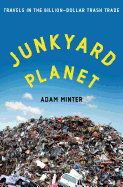Jack Covert Selects - Junkyard Planet
November 14, 2013
Junkyard Planet: Travels in the Billion-Dollar Trash Trade by Adam Minter, Bloomsbury Press, 304 pages, $26. 00, Hardcover, November 2013, ISBN 9781608197910 You have probably wondered (and maybe even think you have a good idea of) what happens to your garbage after it leaves your home. But, have you ever wondered how much your garbage is worth?
Junkyard Planet: Travels in the Billion-Dollar Trash Trade by Adam Minter, Bloomsbury Press, 304 pages, $26.00, Hardcover, November 2013, ISBN 9781608197910
You have probably wondered (and maybe even think you have a good idea of) what happens to your garbage after it leaves your home. But, have you ever wondered how much your garbage is worth? And, further, do you know what kind of global economy you are fueling every time you put your bins out on the curb? Adam Minter has not only thought about these things, he has, with his new book Junkyard Planet, provided an in-depth look at how humans buy, trade, process, and sell what so many of us discard as garbage.
Minter leads the book with a story about something apropos for the upcoming holiday season: Christmas lights. It is about a product primarily consumed in the United States, but this story takes place in China, and sets the tone for what will follow throughout the rest of Junkyard Planet. Interviewing the owner of a scrap-metal processing facility in Shijiao, China, Minter uncovers a particularly valuable piece of trash: copper wire. Your tangled ball of Christmas lights is full of this wire, and when you throw them away there are good odds that someone in China or another developing country will be interested in buying them for that copper.
But, while the benefits of the booming trash trade are numerous, there are also serious concerns and consequences—especially environmental. In the developing economies where this material usually ends up to be processed, there is often little or no regulation of how waste is handled, and the processes in place for separating once-married materials such as plastic and metal are often crude. The scrapper’s original process of separating the rubber sheathing from copper wire in the aforementioned Christmas lights, for example, was to simply dump fuel on the mess and burn it. While this particular scrapper has since found a demand for the recycled rubber and began separating the scrap materials more carefully, there are many materials for which there is little or no demand, and the process for extracting the valuable element creates a dangerous and dirty environment. This illustrates one of Junkyard Planet’s key points: usually, the only thing “green” about recycling on the global scale is the money to be made.
The stories and figures presented in Junkyard Planet are surprising and often amusing, but the book also offers some serious fuel for thought. How can we better take out the trash? Not simply for the good of Mother Nature—though that’s a worthwhile consideration—but for the good of our national and local economies? The motto “Reduce, Reuse, Recycle” sees far greater recognition in its final command: recycle. But as Mr. Minter shows us, recycling is still the least preferable option—well after reduction and reuse. It’s true that recycling is a better option than simply burying or burning our trash, but recycling is an industry like many others, thriving on demand. And the demand is not for cleaner air and water but, quite simply, for cheaper raw materials.


